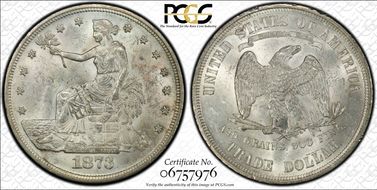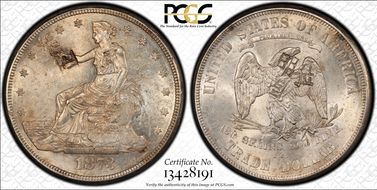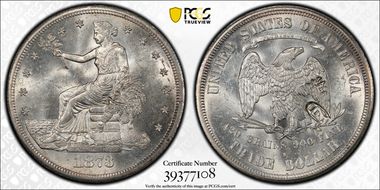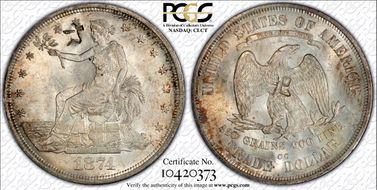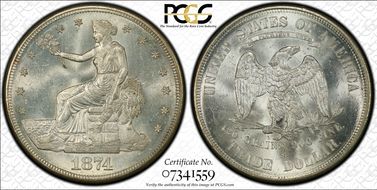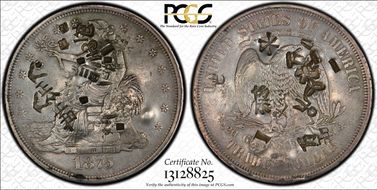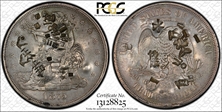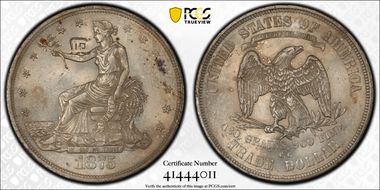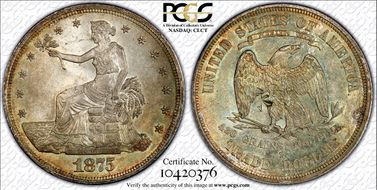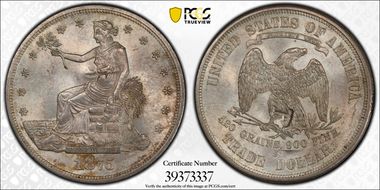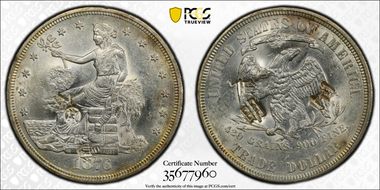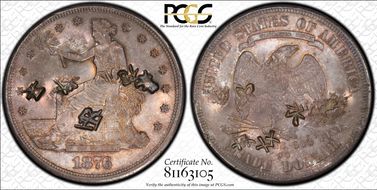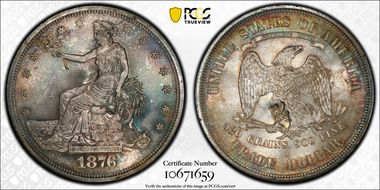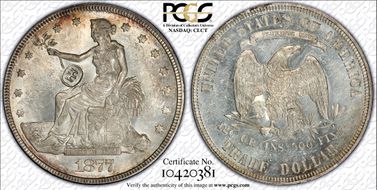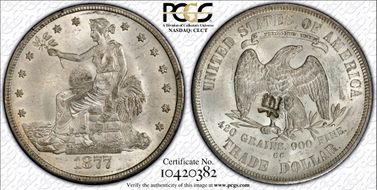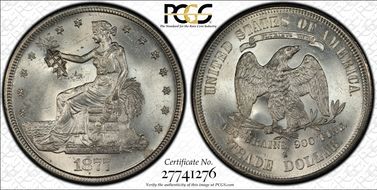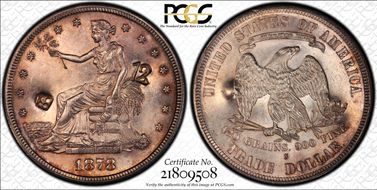David Reimer Chop Marked Trade Dollar Collection 的钱币相册
The 73-P Trade Dollar is probably the third rarest of the series, behind the 75-P and the 78-CC. This example was plucked raw from eBay and quickly made its way into the Legend Collection. Very few 73-Ps have been certified; this is one of the finest.
With a mintage of only 124,5000, the 1873-CC is one of the keys to the series, chopmarked or not.
This is a very nice mint state example of an 1873-S, the most difficult San Francisco Trade dollar to find chop marked. They exist, but are not as nearly common as the other San Francisco issues. One light chop on the obverse, near Miss Liberty's left hand and two interesting, more distinct chop marks on the reverse. Originally from the Northwest collection
Another P mint Trade Dollar that is very difficult to find chopmarked. Most Philadelphia Trade Dollars circulated domestically although a handful, like this one. did make it to the Orient. Many went via London. There is an interesting oblong, incuse chopmark near the eagle's beak.
Readily available chopmarked, but rarely in this state of preservation. Most of the mintage of 1.4 million coins were shipped to China to purchased imports.
There is one hard-to-find chopmark on the obverse of this lusterous S-mint Trade Dollar. I am told that this coin was originally in a straight grade PCGS slab until someone noticed the chopmark.
Ex-Rose. Rarest of all chopmarked Trade dollars, with perhaps a half-dozen known chopmarked. Frank Rose was the godfather of chopmark collecting and author of the reference book "Chopmarks". A Merchant Marine, Rose purchased this coin in the Orient in 1968. Type I/I.
Ex-Rose. Rarest of all chopmarked Trade dollars, with perhaps a half-dozen known chopmarked. Frank Rose was the godfather of chopmark collecting and author of the reference book "Chopmarks". A Merchant Marine, Rose purchased this coin in the Orient in 1968. Type I/I.
Like the 74-CC, the 75-CC is fairly common chop marked.
Type I obverse, Type I reverse, the most common obverse-reverse combination for the 75-S. However, it is certainly not common in this state of preservation. A very pretty coin to look at with blue, green and yellow toning.
The sequence of events that created the S over CC variety has never clearly been explained. Regardless, the variety is scarce. Less evident in the picture, but in-hand the C to the right of the S really pops out.
Another Philadelphia mint Trade Dollar that is difficult to find chopmarked, although not as difficult as the 73, 74 or 75.
More scarce than the 74-CC or 75-CC due to a significantly smaller mintage, the 76-CC Trade Dollar has three distinct reverses: Type I; Type I DDR; and Type II. This coin, the highest graded 76-CC Chop Mark by PCGS, is the more common Type II. For an outstanding example of a Type I DDR, please see my other set: Interesting Duplicates.
Most San Francisco-minted Trade Dollars ended up in the Orient, and this one is no exception. One could argue, though, that none made it back in this exceptional condition with this eye appeal and blue and violet toning. Type I obverse/Type I reverse, the most common combination for the 1876-S.
Still somewhat scarce chopmarked, compared to previous Philadelphia mint issues the 77 P is relatively obtainable chopmarked.
This Carson City dollar saw little use in the Orient and picked up one chopmark on the reverse.
Very clean with some flash left on it, this Trade dollar has a single chop mark prominently placed on the obverse under Miss Liberty's outstretched hand to China.
Extremely rare, probably less than a dozen survive. Only 97,000 were minted and over half of those were melted at the mint. Those that remained, amost all circulated locally. A small handful, including this one, did make it to China.
One of the most common Trade dollars with a relatively high mintage, the 78-S is somewhat difficult to find with chopmarks. Of all the S-mint Trade dollars, why was the 78-S less likely to be used in commerce with China? This one is beautifully toned, with an arabic numeral chopmark "12." Chinese merchants occasionally used arabic numerals for chopmarks.




















